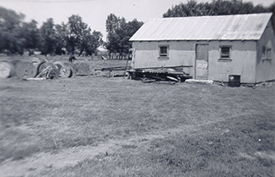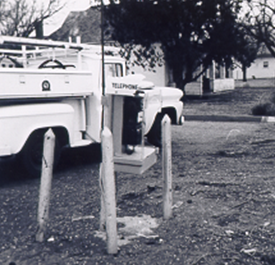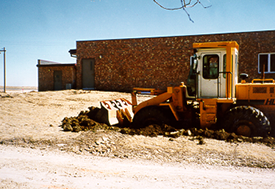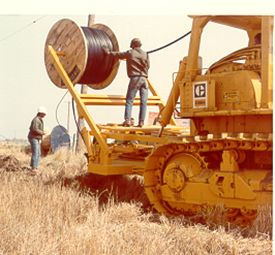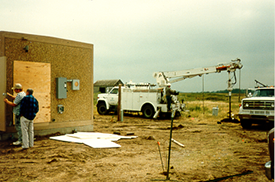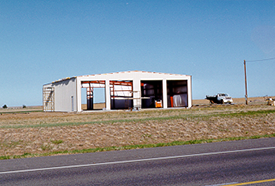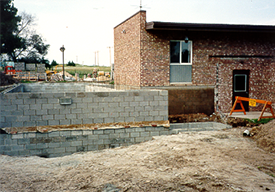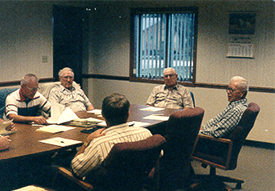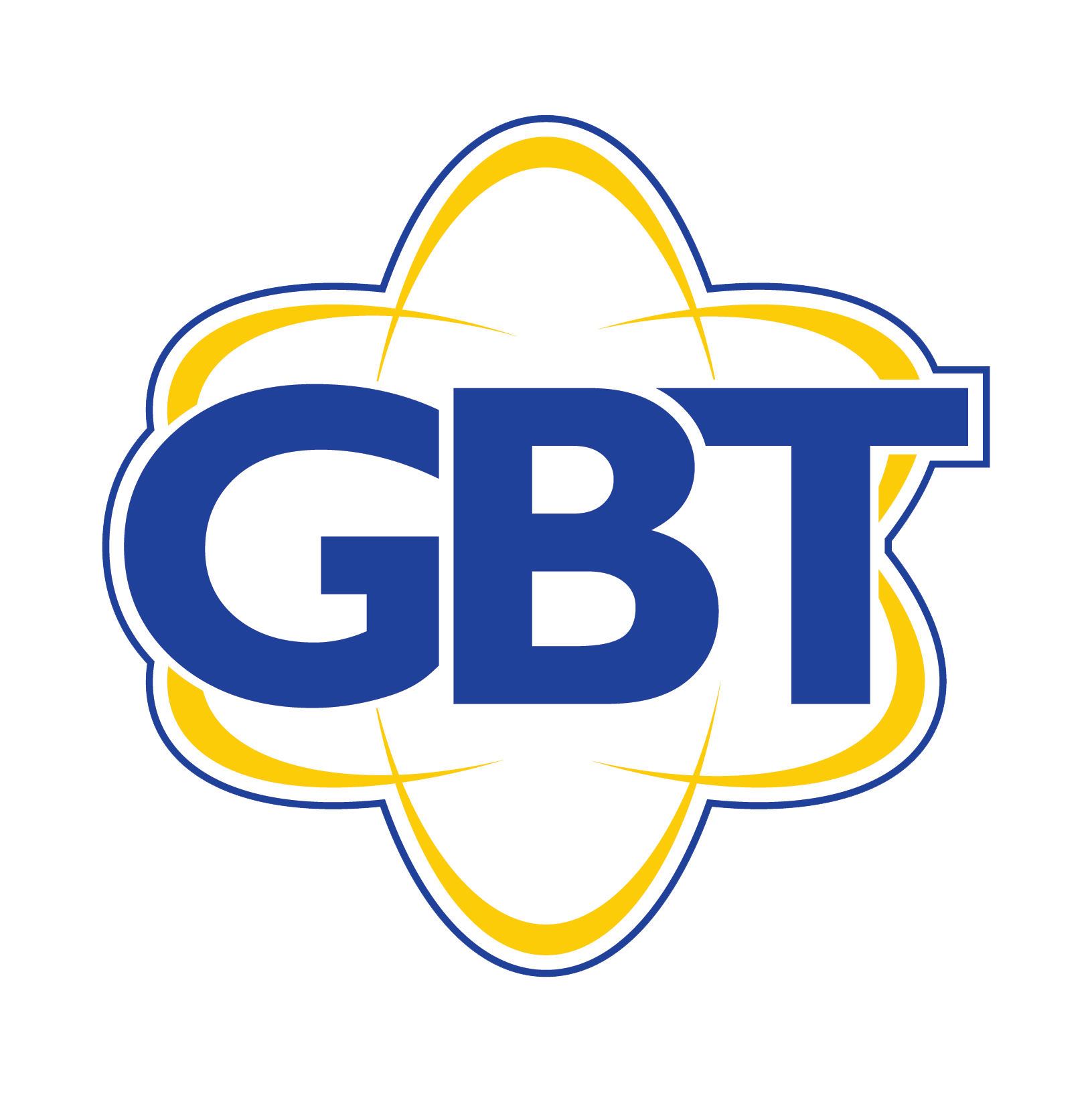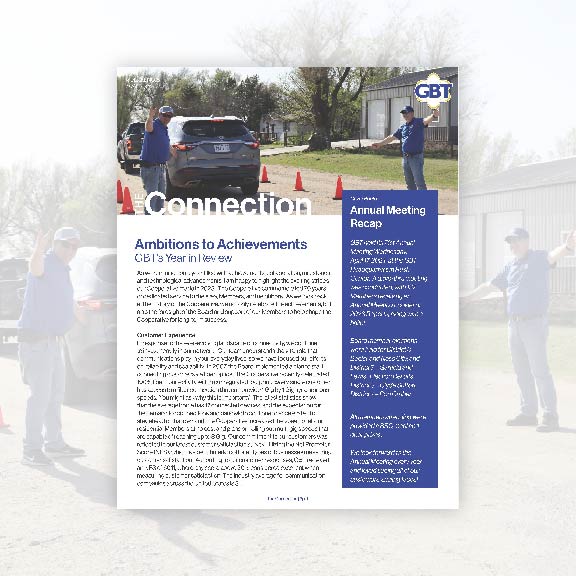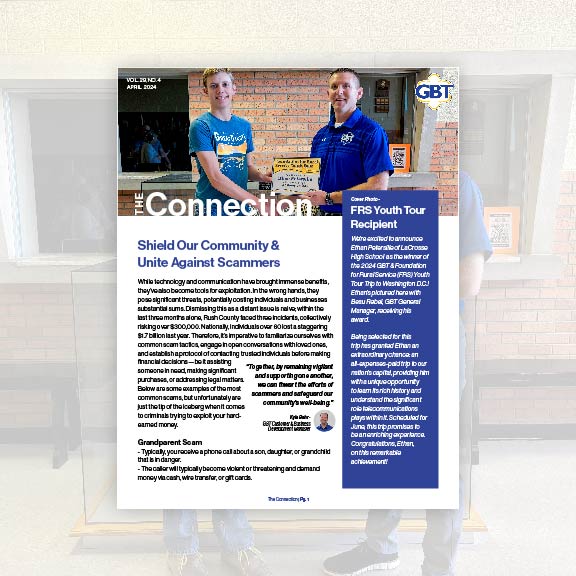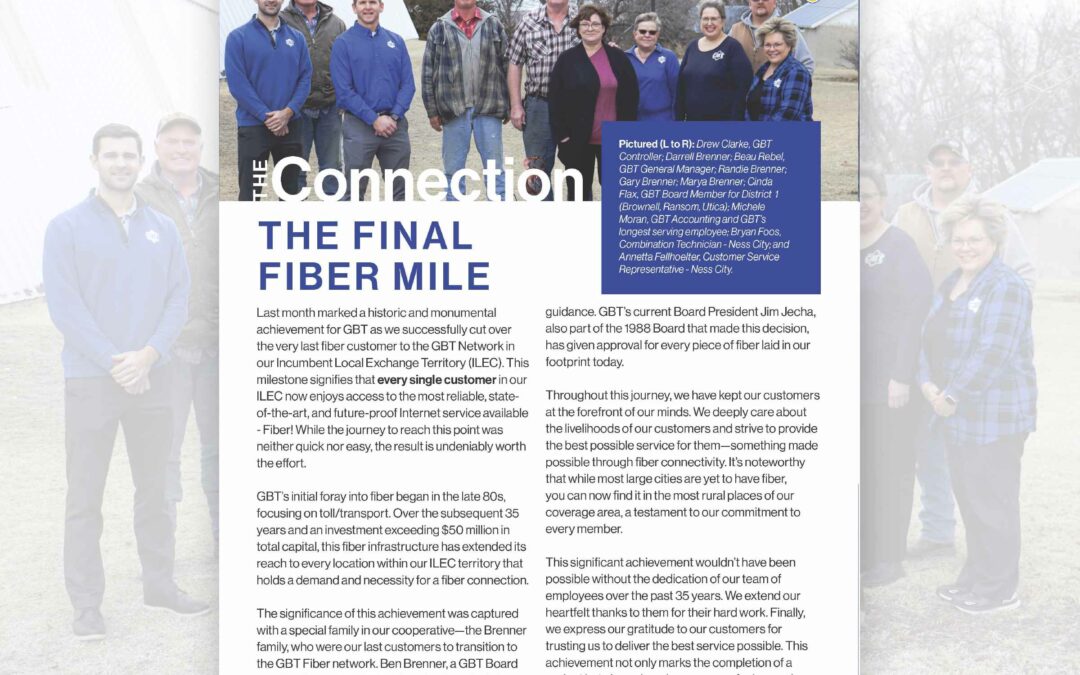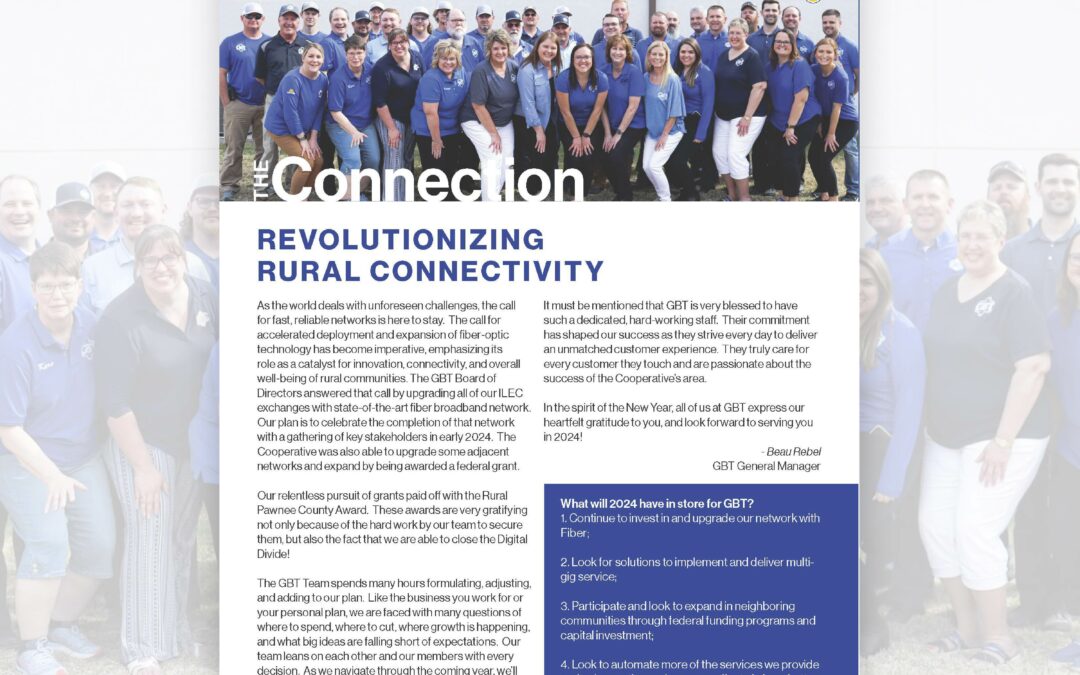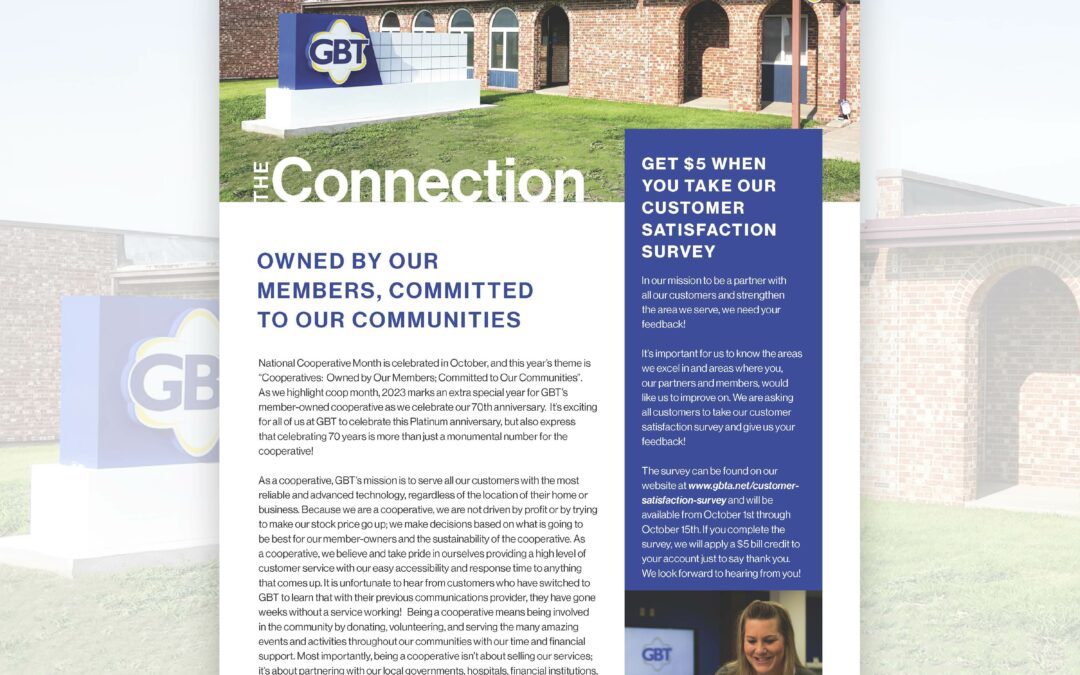The Golden Belt Telephone Association, Inc.
Labor Day 1949 – President Harry S. Truman announced the Rural Electrification Act would be amended to provide loans for the development of modern telephone service in rural areas. Herman Folkerts, a director of the Albert Telephone Company, either heard President Truman make that announcement, or he read the report of the President’s address which appeared in the Hutchinson Herald the following morning. Herman took this announcement seriously, and visited with neighboring telephone companies about the possibility of consolidating and improving telephone service with the help of the REA Telephone Loan Program.
1952 – Meetings were held with a number of the boards of directors of various telephone companies in the area. Five of these companies were: The Albert Telephone Company, The Pivonka Telephone Company of Timken, The Farmers Telephone Company of Rush County – Nekoma Exchange, Rush Center Telephone Company, and The Farmers Telephone Company of Rozel. These five companies agreed to purchase the Alexander Telephone Company.
January 2, 1953 – Representatives of these companies continued to meet, and on this date The Golden Belt Telephone Association incorporated. The original board members were: William F. Schroter, President; Martin Hemken, Vice President; Walter W. Becker, Secretary-Treasurer; Charles M. Arnold; Roland Bahr; Herman Folkerts; James Jecha; Parm Renner; and Earl Ratliff.
October 20, 1954 – David McKay was hired as the first General Manager. Dave had also heard President Truman make the announcement about REA while he and his wife Mary were living in New Jersey. Mary and Dave decided if congress did amend the REA Act, they would seriously consider moving to Kansas, as Mary was originally from the community of Zook, Kansas. Construction of the system started in the fall of 1955, and all of the exchanges were converted to dial service in 1956, serving 722 subscribers.
Saturday, March 23, 1957 – A snow and ice storm hit the Golden Belt area, breaking over 800 poles. The following Monday, not one telephone in the system was working. The system was rebuilt over the next 60 days by local labor.
1958 – Golden Belt negotiated the purchase of the Bazine Exchange from the Western Light and Telephone Company. During the same year, the Lewis Telephone Exchange, which served the Lewis and Garfield area, held meetings with Golden Belt to negotiate an operating agreement and discuss a possible merger. The merger was completed in April 1960.
1961 – The Otis Telephone Company, The Farmers Mutual Telephone Company of Ransom, The Arnold Mutual Telephone Company, and The Brownell Central Telephone Company were acquired and converted to dial telephone service.
1962 – The Farmers Telephone Company of Rush County – McCracken Exchange, The Utica Telephone Company, and the Beeler Telephone Company were acquired and converted to dial service the following year.
1977 – An operating agreement was entered into with the Burdett Telephone Company, which then merged into Golden Belt in 1981.
1982 – The Bison Telephone Company was purchased and merged into the system. During the early 1980s, all Golden Belt exchanges were upgraded to one-party service.
October 27, 1986 – William F. Schroter served as President of Golden Belt Telephone from the date of incorporation in 1953 until his death. Charles M. Arnold, an original Board member, assumed the Presidency.
February 1, 1988 – General Manager David McKay retired. Following this, Golden Belt has had four other General Managers: Wendell Brozek (retired), Arlyn Solomon (retired), Gerald Washburn (retired), and Beau Rebel (current).
1989 – Golden Belt placed approximately 120 miles of fiber optic cable in the ground, and brought into service a digital host central office in Rush Center. The remaining central offices were upgraded to digital service by 1991.
April 1, 1991 – Charles M. Arnold, an original board member, retired as President after more than 40 years of service to the telephone industry in this area. Steven L. Miller was elected President, and served in that capacity until 1995, when he resigned to take a position with Golden Belt.
1992 & 1998 – Additional office and storage space was added to the corporate office building in Rush Center.
1995 – Golden Belt entered the cable television service by purchasing the Utica CATV system. Since then, 23 additional systems have been added. Golden Belt now serves cable television customers in Albert, Alexander, Bazine, Beeler, Bison, Brownell, Burdett, Ellis, Garfield, LaCrosse, Lewis, Liebenthal, Macksville, McCracken, Ness City, Otis, Pawnee Rock, Ransom, Rozel, Rush Center, St. John, Stafford, Timken, and Utica. All towns are served from a combined super headend located at Rush Center.
Frank E. Kershner assumed the Presidency of Golden Belt Telephone November 1, 1995 through April 14, 2008. James A. Jecha was then elected President and serves in that capacity today.
1997 – Gerald Washburn was appointed General Manager.
The telephone exchanges of Ness City and Ellis were purchased and merged into the system.
The first satellite office was established at Ellis.
1998 – Since 1998, approximately 1,200 miles of fiber optic cable have been installed.
1999 – The second satellite office was established at Ness City.
2005 – Nex-Tech Wireless LLC, a new cellular telephone service, was launched. Golden Belt Telephone partnered with Rural Telephone of Lenora and Mutual Telephone of Little River to provide this new service.
2007 – The Fiber-To-The-Home initiative was launched and completed in 2012 for the cities of Albert, Bazine, Bison, Brownell, Burdett, Ellis, Garfield, Lewis, McCracken, Ness City, Otis, Ransom, Rozel, Rush Center, and Utica.
2009 – A former bank building was purchased at 114 West Main Street in Ness City to house the satellite office.
2011 – Beau Rebel was appointed General Manager.
2012 – A building was purchased at 101 West 9th Street in Ellis to house the satellite office.
2014 – The third satellite office was opened at 122 West 5th Street in Larned.
The Stafford Cable Television System was purchased from Vyve Broadband.
A new entrance and retail space was added to the Rush Center office.
2015 – Fiber-To-The-Home launched in Alexander and Timken exchanges.
2016 – Fiber-To-The-Home launched in rural Ellis and LaCrosse business district.
Gig-Certified Award given by NTCA The Rural Broadband Association.
2017 – Fiber-To-The-Home launched in rural Albert, rural Lewis, and Larned business district.
The fourth satellite office was opened in St. John.
Smart Rural Community Award given by NTCA The Rural Broadband Association.
2018 – Fiber-To-The-Home is launched in rural Ness City and Beeler.
2019 – Fiber-To-The-Home is launched in rural Ransom.
2021 – Fiber-To-The-Home is launched in Rural Bazine, Rural Brownell, & Rural McCracken. GBT shuts down its cable TV headend and transitions to offering 100% Streaming TV service.
2022 – Fiber-To-The-Home is launched in Rural Garfield
2023 – GBT celebrates its 70th year of Incorporation. Fiber-To-the Home is launched in Rural Bison, Rural Burdett, Rural Otis, Rural Utica.
GBT kicks off expansion of Fiber services to residential areas of Larned.
GBT is awarded $6.782 million grant from State of Kansas through the Kansas Capital Project Funds Broadband Infrastructure Program to build fiber to the Eastern Half of Rural Pawnee County and a small portion of Rural Stafford County. Construction of the grant project begins in 2023.
2024 – Fiber-To-The Home is launched in Rural Beeler. Upon completion, 100% of GBT’s cooperative area is now served with Fiber-optic technology.
Board of Directors are:
James A. Jecha, President, Timken
Clyde Sutton, Vice President, Ness City
Cinda Flax, Secretary-Treasurer, Ransom
Ron Gruber, Lewis
Brian Hammeke, Rozel
Gene Knieling, Rush Center
Philip Martin, Ellis
